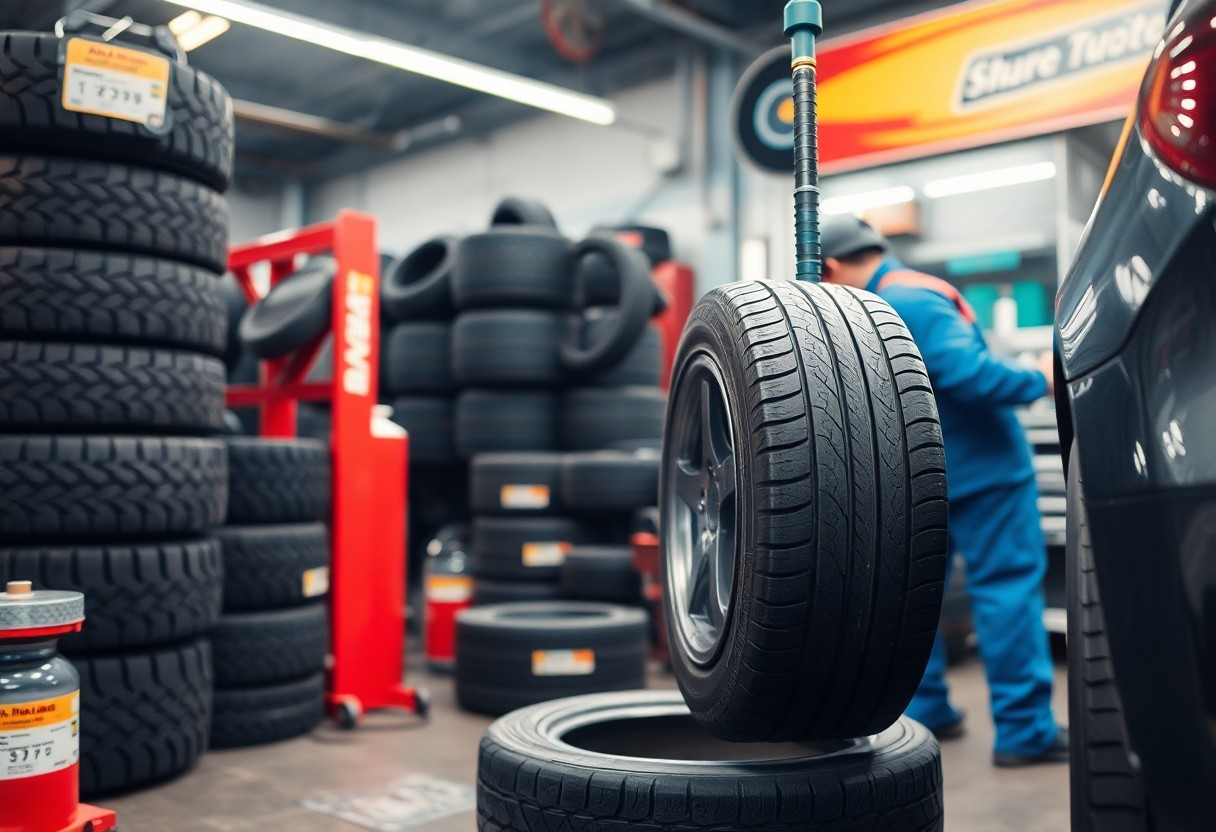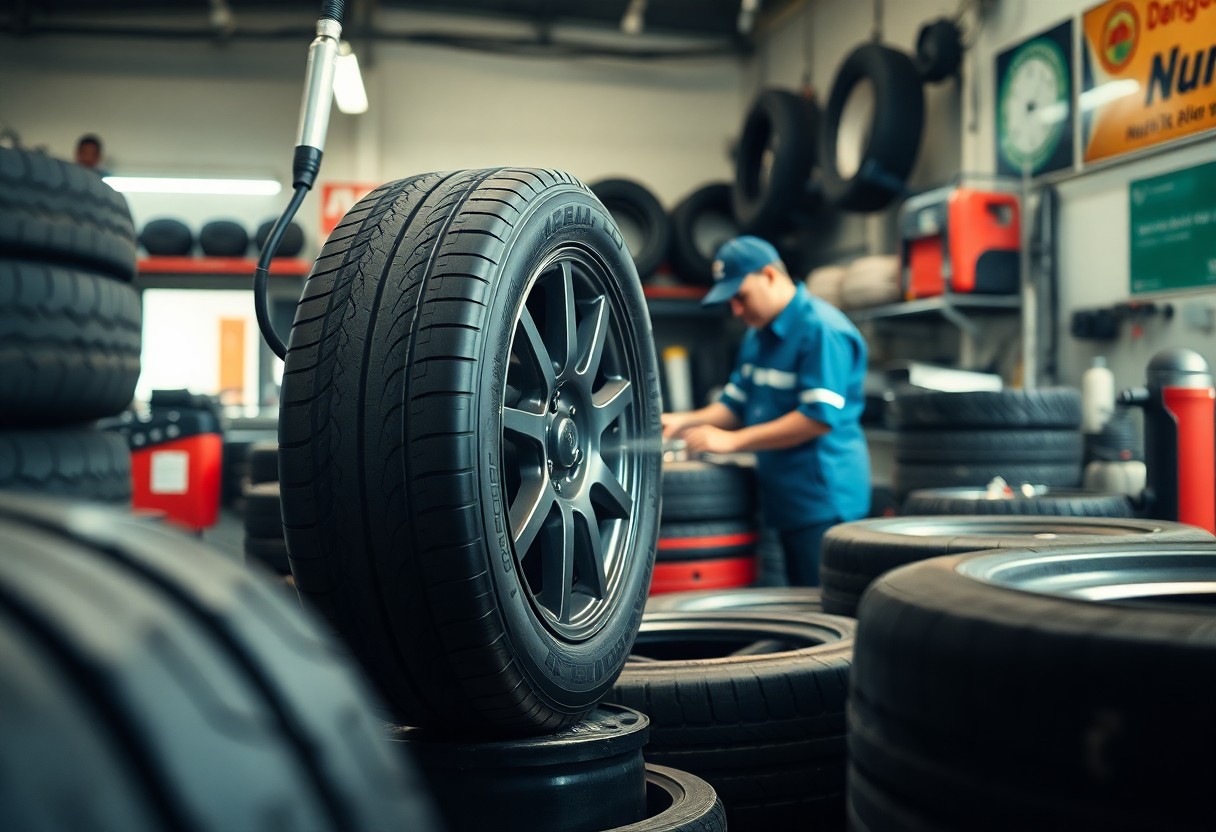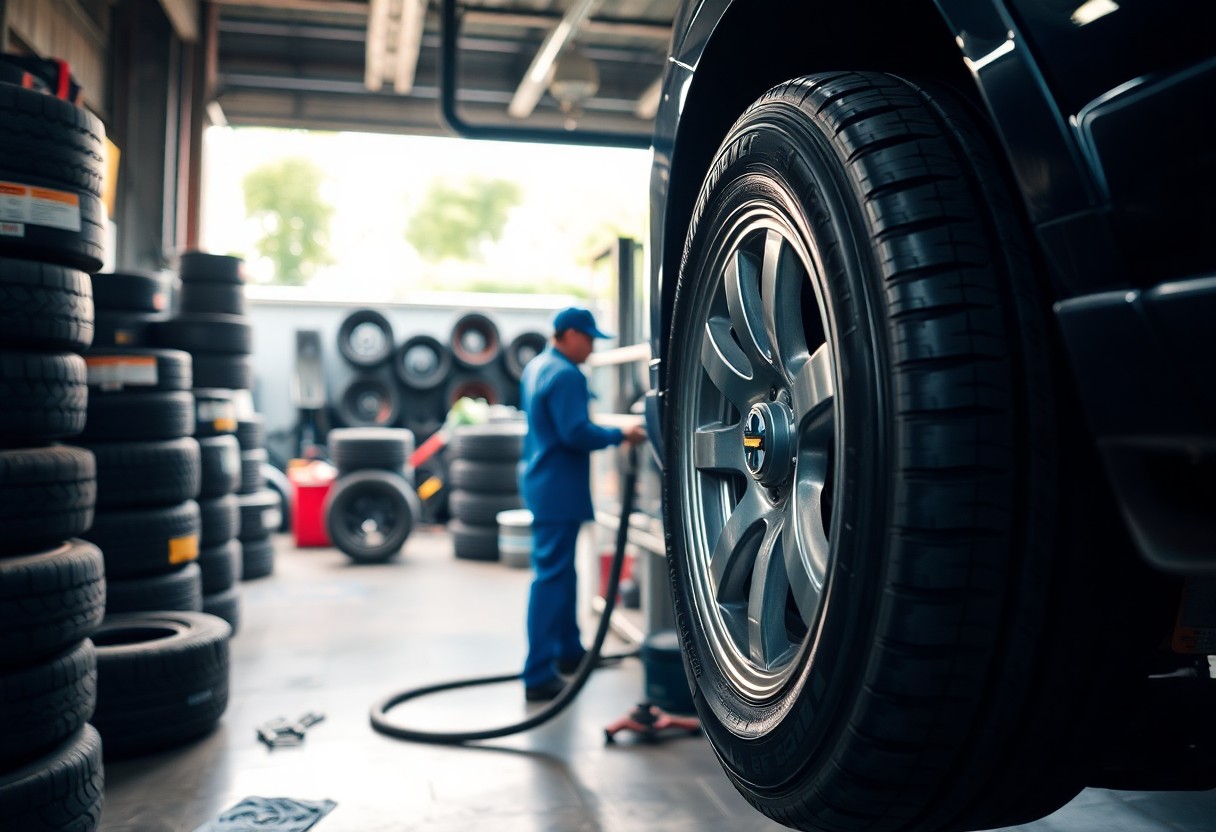You may not realize it, but filling your tyres with nitrogen gas can have significant benefits for your vehicle’s performance and safety. Unlike regular air, nitrogen helps maintain optimal tyre pressure, which can enhance fuel efficiency and extend the lifespan of your tyres. Additionally, nitrogen reduces the risk of blowouts, especially in high-temperature conditions, making your driving experience safer. In Klang, more tyre shops are offering nitrogen fill-ups, and understanding why this matters can empower you to make informed decisions for your automotive maintenance.

Key Takeaways:
- Nitrogen gas helps to maintain tire pressure longer than regular air, reducing the frequency of checks and inflation.
- Using nitrogen can lead to improved fuel efficiency due to consistent tire pressure, which can save drivers money on fuel costs.
- Nitrogen inflation minimizes moisture and oxygen exposure in tires, which can prolong tire lifespan and performance.
- Tires filled with nitrogen experience less temperature fluctuation, which contributes to enhanced safety and handling.
- Klang has easily accessible tyre shops offering nitrogen filling services at competitive prices.
- Many vehicle manufacturers endorse nitrogen inflation for specific tire types, highlighting its benefits for high-performance cars.
- Shops in Klang often provide a nitrogen tire inflation service as part of their offerings, making it convenient for consumers to take advantage of its benefits.

The Science of Nitrogen-Filled Tyres
Nitrogen-filled tyres enhance vehicle performance by maintaining optimal air pressure and minimizing moisture buildup. The inert nature of nitrogen reduces oxidation, extending the life of the tyre and improving fuel efficiency. Moreover, changes in temperature have less impact on nitrogen-filled tyres, ensuring that your vehicle maintains consistent handling characteristics across various weather conditions.
The Physics Behind Inflation
Inflation involves gas molecules colliding against the tyre walls, creating pressure. Nitrogen molecules are larger than the oxygen molecules found in regular air, leading to slower diffusion through the tyre rubber. This property allows nitrogen to maintain consistent pressure for a longer duration, providing you with better performance and safety.
Comparing Nitrogen vs. Air in Tyres
Utilizing nitrogen instead of regular air for tyre inflation offers significant advantages. While air contains about 78% nitrogen, it also includes moisture and other gases. Nitrogen-filled tyres resist pressure loss and prevent moisture from causing internal corrosion, offering a more stable solution for effective performance.
Key Differences Between Nitrogen and Air in Tyres
| Aspect | Nitrogen-Filled Tyres |
|---|---|
| Pressure Retention | Better retention, leading to less frequent checks |
| Moisture Content | Dry and inert, preventing oxidation |
| Temperature Stability | More consistent pressure with temperature changes |
| Fuel Efficiency | Improves due to optimal tyre performance |
By choosing nitrogen for your tyre inflation, you mitigate the risks associated with fluctuating temperatures and moisture exposure. The performance benefits become apparent over time, as you experience improved fuel efficiency and longer tyre life. This small step can make a notable difference in your vehicle management and overall driving experience.

Economical Benefits of Nitrogen in Tyre Shops
Utilizing nitrogen in your tyres can lead to several significant economic advantages. Not only does it contribute to savings in maintenance costs, but it also maximizes the performance of your vehicle’s tyres. By investing in nitrogen filling, you can enjoy longer-lasting tyres and improved fuel efficiency, ultimately resulting in lower overall operating costs.
Enhanced Tyre Longevity
Nitrogen-filled tyres tend to last longer than those filled with regular air due to the reduced rate of leakage and less oxidation. The absence of moisture inside the tyres helps prevent corrosion, which can deteriorate the internal components. As a result, you’ll find your tyres maintain their integrity and performance over an extended period, leading to fewer replacements and better overall value.
Fuel Efficiency and Cost Savings
Properly inflated nitrogen tyres boost your vehicle’s fuel efficiency. Maintaining optimal tyre pressure reduces rolling resistance, allowing your vehicle to operate more efficiently. This can translate into substantial fuel savings over time, especially for those who log significant mileage. In fact, a study revealed that improved tyre pressure could enhance fuel efficiency by as much as 3.3%, which equates to hundreds of dollars annually on fuel costs.
Consider that if you drive an average vehicle, with fuel costs around $3 per gallon and an annual mileage of 15,000 miles, improving tyre pressure could save you around $100 each year. With nitrogen inflation, the need for frequent pressure checks is reduced due to its ability to maintain pressure longer than standard air. This simplifies your routine and helps keep your fuel costs lower, allowing you to allocate those savings towards other expenses or investments. In the long run, adopting nitrogen for your tyres not only enhances driving safety but also supports a more economical driving experience.
Safety First: How Nitrogen Correlates with Road Safety
Utilizing nitrogen in your tyres significantly enhances road safety by ensuring optimal tyre performance under various driving conditions. This advantage directly relates to your vehicle’s handling and braking capabilities, which are necessary for avoiding accidents. With a stable internal environment, nitrogen reduces the risk of fluctuating pressures caused by temperature changes, allowing you to maintain better control of your vehicle.
Maintaining Optimal Pressure
With nitrogen, maintaining optimal tyre pressure becomes easier, as nitrogen molecules are larger and escape from the tyre at a slower rate than regular air. Keeping tyres inflated to the recommended levels reduces rolling resistance, enhancing fuel efficiency while also promoting even tread wear. This leads to longer tyre life and keeps your car safer on the road.
Reducing Risk of Blowouts
Nitrogen also plays a critical role in reducing the risk of blowouts. The risk typically increases due to overheating, which can cause the tyre to fail when air pressure is inadequate. Nitrogen gas, being more stable in extreme temperatures, helps prevent an unexpected loss of pressure associated with heating, ensuring your tyres maintain structural integrity.
Through its stability, nitrogen diminishes the potential for blowouts, particularly in high-speed conditions or during long-distance journeys. Statistical analyses indicate that vehicles with properly inflated nitrogen-filled tyres experience fewer blowouts compared to those using regular air. For instance, a study highlighted that improper tyre inflation accounts for nearly 31% of tyre-related crashes, emphasizing how maintaining the right pressure can substantially enhance your safety on the road. Investing in nitrogen-filled tyres not only boosts safety but also gives you peace of mind during every drive.
What to Expect When Visiting Klang’s Nitrogen Tyre Shops
Your visit to one of Klang’s nitrogen tyre shops will likely be both efficient and informative. As you arrive, a technician will assess your tyres, checking for any visible damage or uneven wear. Once your vehicle is ready, they’ll begin the nitrogen inflation process, ensuring that your tyres are filled to the optimal pressure for performance and safety. You can expect a quick turnaround, usually within 30 minutes, during which staff can explain the benefits of nitrogen over traditional air to enhance your understanding.
The Process of Nitrogen Inflation
The nitrogen inflation process is straightforward and hassle-free. Technicians will first deflate your tyres, removing any air before filling them with nitrogen. Specialised equipment is used to ensure the correct concentration of nitrogen, typically around 95%, and they will seal the tyres to prevent any gas leakage. The result is a more stable tyre pressure during your drive, which can ultimately lead to improved handling and fuel efficiency.
Common Misconceptions Explained
There’s often confusion regarding nitrogen use in tyres, with many thinking it’s just a marketing gimmick. One prevalent belief is that nitrogen is only beneficial for high-performance or racing vehicles. However, the advantages of nitrogen inflation, such as maintaining tyre pressure longer and reducing moisture buildup, apply across all types of vehicles, including daily commutes. The truth is that anyone can benefit from using nitrogen in their tyres, improving safety and extending tyre life.
Some drivers assume that nitrogen inflation requires specific maintenance, but it’s quite the opposite. No specialised checks are necessary beyond regular tyre inspections. Another myth is that nitrogen-filled tyres never lose pressure; they still can, but at a reduced rate compared to standard air. Regularly checking your tyre pressure remains necessary. In reality, utilizing nitrogen is a proactive choice that enhances your vehicle’s performance, regardless of whether you are an everyday driver or a racing enthusiast. Embracing nitrogen in your tyres offers advantages that any vehicle owner can appreciate.
The Environmental Impact of Nitrogen Tyre Inflation
Nitrogen tyre inflation presents a compelling solution for reducing the environmental impact associated with traditional air-filled tyres. Compared to regular air, which is about 78% nitrogen, using pure nitrogen decreases the rate of deflation and promotes more efficient fuel consumption. Consequently, this leads to lower emissions of harmful pollutants, diminishing your overall carbon footprint.
Reducing Carbon Footprint
Using nitrogen in your tyres helps to reduce your carbon footprint significantly. With proper tyre pressure maintained, your vehicle experiences improved fuel efficiency, translating to decreased carbon emissions. Statistics show that for every 1% increase in fuel efficiency, carbon emissions can drop by nearly 2.5%. Simply put, driving on nitrogen-inflated tyres not only enhances your vehicle’s performance but also plays a vital role in combating climate change.
Promoting Sustainable Practices
Choosing nitrogen inflation supports sustainable practices in the automotive industry. You contribute to a greener planet by minimizing the frequency of tyre replacements and extending the lifespan of your tyres. Tyres inflated with nitrogen are less prone to wear and tear, which means fewer discarded tyres end up in landfills. This transition aligns with broader efforts toward sustainability, where responsible consumption is key to environmental stewardship.
Promoting sustainable practices extends beyond just your vehicle. Many nitrogen tyre shops are increasingly adopting eco-friendly operations, such as recycling old tyres and utilizing energy-efficient equipment. By investing in nitrogen inflation, you’re not merely enhancing your driving experience—you’re also supporting local businesses that prioritize environmental conservation. This collaborative effort contributes to a larger movement aimed at preserving our planet for future generations.
Conclusion
Conclusively, utilizing nitrogen gas in your tyres at Klang tyre shops enhances performance, extends tyre life, and improves safety by maintaining optimal pressure. You can enjoy better fuel efficiency and a more stable ride while reducing the frequency of pressure checks and inflation. By choosing nitrogen, you’re making a smart investment in your vehicle’s overall health and longevity, ensuring a smoother and safer driving experience for you and your passengers.
FAQ
Q: What is the benefit of using nitrogen gas for tyre inflation?
A: Using nitrogen gas for tyre inflation has several benefits. Nitrogen molecules are larger than oxygen molecules, causing nitrogen to seep out of tyres more slowly than air. This helps maintain tyre pressure for a longer period, improving fuel efficiency, tyre lifespan, and overall vehicle performance.
Q: How do I know if a tyre shop in Klang offers nitrogen gas inflation?
A: Most tyre shops that provide nitrogen gas inflation will display signs indicating their services. Additionally, you can call ahead and inquire if they offer nitrogen filling or check their website for detailed service descriptions.
Q: Is nitrogen inflation more expensive than standard air inflation?
A: Generally, nitrogen inflation may come with a slightly higher initial cost due to the process of generating and filling nitrogen. However, the benefits, such as better tyre pressure retention and reduced wear, can lead to long-term savings on fuel and tyre replacement costs.
Q: Can I mix regular air and nitrogen in my tyres?
A: While it’s possible to mix regular air and nitrogen in your tyres, it’s not advisable. If your tyres are already filled with air, the best option is to deflate them and refill entirely with nitrogen. Mixing can undermine some of the benefits that nitrogen offers.
Q: How often should I check my tyre pressure if I’ve used nitrogen gas?
A: Even with nitrogen inflation, it’s recommended to check your tyre pressure at least once a month or before long trips. This practice ensures that your tyres remain at the optimal pressure for safety and performance.
Q: Are there any disadvantages to using nitrogen gas in tyres?
A: The main disadvantage of using nitrogen is the potential limited availability, as not all tyre shops provide this service. Additionally, some drivers may find the cost of nitrogen inflation unnecessary compared to regular air, especially if they frequently check and maintain tyre pressure.
Q: Will nitrogen gas make my tyres cool down faster compared to regular air?
A: Nitrogen-filled tyres generally run cooler than those filled with regular air because nitrogen has less moisture and tends to create less heat. This can help reduce tyre wear and improve performance, especially during high-speed driving or in hot conditions.
